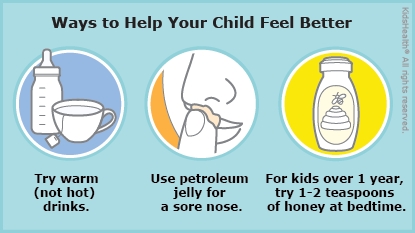Children with a cold may have a runny or stuffy nose, sneezing, a cough, a sore throat, and a low fever. Colds are caused by viruses (types of germs). They clear up on their own within about 2 weeks. Antibiotics don't work against viruses, so they can't treat colds.
Here's how to help your child feel more comfortable while they get better.

How do colds spread to others? Colds can spread when:
- A person with a cold coughs and/or sneezes the virus into the air, and someone else breathes it in.
- A virus gets in the eyes, nose, or mouth. This can happen by touching someone who has a cold, or by touching a hard surface (like a doorknob) that has the virus on it, and then touching your eyes, mouth, or nose.
How can we prevent getting colds? Colds are contagious, especially during the first few days of symptoms. To protect your family from colds:
- Try to stay away from people who have colds.
- Teach everyone to wash their hands well and often using soap and water. They should wash for at least 20 seconds, then rinse and dry thoroughly. This is especially important after coughing or sneezing, and before and after eating. If soap and water are not available, use a hand sanitizer with at least 60 percent alcohol.
- Clean tabletops, doorknobs, and other hard surfaces with a cleaner that kills viruses.




